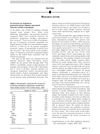 1 citations,
May 2021 in “BMC Proceedings”
1 citations,
May 2021 in “BMC Proceedings” The document concludes that more research is needed to reduce frequent hospital visits, addiction medicine education improves with specific training, early breast cancer surgery findings are emerging, nipple smears are not very accurate, surgery for older melanoma patients doesn't extend life, a genetic condition in infants can often be treated with one drug, doctors are inconsistent with blood clot medication, a certain gene may protect against cell damage, muscle gene overexpression affects many other genes, and some mitochondrial genes are less active in mice with tumors.
 32 citations,
July 2020 in “Journal of The American Academy of Dermatology”
32 citations,
July 2020 in “Journal of The American Academy of Dermatology” AGA linked to worse COVID-19 outcomes in men.
 23 citations,
September 2021 in “Frontiers in Cellular and Infection Microbiology”
23 citations,
September 2021 in “Frontiers in Cellular and Infection Microbiology” Testosterone's effects on COVID-19 are unclear and need more research.
 1 citations,
December 2022 in “BMC Public Health”
1 citations,
December 2022 in “BMC Public Health” Long-term effects of COVID-19 can vary over time and are more likely in certain age and gender groups, while race, income, and education levels have little to no impact. Ongoing medical care is needed due to potential complications.
 11 citations,
December 2020 in “Journal of Drugs in Dermatology”
11 citations,
December 2020 in “Journal of Drugs in Dermatology” COVID-19 can cause various skin symptoms that usually improve with proper treatment.
 1 citations,
December 2022 in “PubMed”
1 citations,
December 2022 in “PubMed” Psoriasis treatments don't raise severe COVID-19 risk, except for acitretin.
 41 citations,
February 2021 in “Cureus”
41 citations,
February 2021 in “Cureus” Dutasteride treatment in men with mild to moderate COVID-19 reduced viral shedding, inflammation, and recovery time without serious side effects.
 October 2020 in “Проблемы эндокринологии”
October 2020 in “Проблемы эндокринологии” Men with higher androgen levels may have severe COVID-19 symptoms, but those on antiandrogen therapy are less likely to contract the virus and have milder symptoms. Anti-androgen drugs could potentially treat COVID-19, but more research is needed.
 1 citations,
September 2022 in “Journal of Medical Case Reports”
1 citations,
September 2022 in “Journal of Medical Case Reports” Rehabilitation therapy helped a severe COVID-19 patient regain muscle mass and return to normal life.
 13 citations,
April 2023 in “Nature communications”
13 citations,
April 2023 in “Nature communications” Long COVID patients have more health issues than non-infected people.
 October 2021 in “Nepal journal of dermatology, venereology & leprology”
October 2021 in “Nepal journal of dermatology, venereology & leprology” COVID-19 can cause skin problems directly or from using protective gear and sanitizers, and knowing this can help treat patients better.
 49 citations,
May 2020 in “Frontiers in Public Health”
49 citations,
May 2020 in “Frontiers in Public Health” Insulin resistance linked to obesity may increase COVID-19 severity.
 3 citations,
September 2022 in “Frontiers in psychiatry”
3 citations,
September 2022 in “Frontiers in psychiatry” University students in Egypt experienced high stress during COVID-19's third wave, with negative coping mechanisms being more common.
 7 citations,
December 2021 in “Journal of Infection”
7 citations,
December 2021 in “Journal of Infection” One in four people still had symptoms like weight loss, hair loss, and fatigue 12-14 weeks after recovering from COVID-19.
 6 citations,
May 2021 in “Clinical Chemistry and Laboratory Medicine”
6 citations,
May 2021 in “Clinical Chemistry and Laboratory Medicine” Different ACE2 gene versions may affect COVID-19 impact based on age and suggest some hair loss drugs could be potential treatments.
 15 citations,
April 2022 in “Immunology”
15 citations,
April 2022 in “Immunology” Men and women get COVID-19 at similar rates, but men tend to get sicker and have a higher risk of dying, while women usually have stronger immune responses and vaccine reactions.
 9 citations,
November 2020 in “Medical Hypotheses”
9 citations,
November 2020 in “Medical Hypotheses” Hair loss may link to weaker COVID-19 immunity, suggesting possible need for extra vaccine boost.
 139 citations,
December 2020 in “Cell Stem Cell”
139 citations,
December 2020 in “Cell Stem Cell” Male hormones affect COVID-19 severity and certain drugs targeting these hormones could help reduce the risk.
5 citations,
May 2020 in “Journal of the American Academy of Dermatology” AGA might indicate higher risk for severe COVID-19.
 1 citations,
July 2021 in “Journal of The American Academy of Dermatology”
1 citations,
July 2021 in “Journal of The American Academy of Dermatology” Face mask-related injuries in U.S. emergency departments rose by 2400% during the COVID-19 pandemic, with most injuries being dermatitis and lacerations.
 36 citations,
November 2020 in “Journal of The European Academy of Dermatology and Venereology”
36 citations,
November 2020 in “Journal of The European Academy of Dermatology and Venereology” 5-alpha-reductase inhibitors may reduce COVID-19 symptoms in bald males.
 71 citations,
April 2020 in “Journal of Cosmetic Dermatology”
71 citations,
April 2020 in “Journal of Cosmetic Dermatology” Genetic differences may affect COVID-19 deaths; anti-androgens could be potential treatment.
 January 2021 in “Journal of The European Academy of Dermatology and Venereology”
January 2021 in “Journal of The European Academy of Dermatology and Venereology” Men with hair loss who take a certain type of medication may experience fewer COVID-19 symptoms.
 21 citations,
January 2021 in “Journal of infection and chemotherapy”
21 citations,
January 2021 in “Journal of infection and chemotherapy” Men, diabetes, and high inflammation levels lead to higher COVID-19 antibodies.
 February 2024 in “Psychoneuroendocrinology”
February 2024 in “Psychoneuroendocrinology” Mothers with lower stress during pregnancy but higher stress after birth had infants with lower development scores.
 May 2023 in “Dermatology Reports”
May 2023 in “Dermatology Reports” The study found that skin conditions in COVID-19 patients can signal serious internal organ damage and may be life-threatening.

Icosapent ethyl may help treat long-lasting symptoms after COVID-19.
 56 citations,
May 2021 in “Journal of infection/The Journal of infection”
56 citations,
May 2021 in “Journal of infection/The Journal of infection” Most hospitalized COVID-19 patients had long-term symptoms like fatigue and hair loss, with women and those sicker during hospitalization at higher risk.
 April 2023 in “American Journal of Transplantation”
April 2023 in “American Journal of Transplantation” Hormone replacement therapy may lower the risk of severe COVID-19 outcomes in non-immunosuppressed people and male organ transplant recipients.
 68 citations,
May 2021 in “Endocrine”
68 citations,
May 2021 in “Endocrine” People with diabetes or obesity should manage their conditions carefully as they have a higher risk of severe COVID-19.




























